Best diabetic dog treats for a healthy, satisfied pet in 2025
We’ve taken the hard work out of finding the best diabetic dog treats. Reward your pup without disrupting their diet.

Keeping your diabetic dog healthy means sticking to a diet rich in protein and complex carbohydrates while avoiding foods high in simple sugars, which is where the best diabetic dog treats come in. We’ve found high-quality options and got vets to weigh in on the ingredients too.
The best diabetic dog foods take the guessing game out of your selection by striking the right balance of ingredients, but food is only part of a dog’s diet. Dogs also need treats, which are a tasty complement to mealtimes, are invaluable for training, and help you create a strong bond with your pet.
But dogs with diabetes need special treats that don’t affect their blood sugar levels. As Dr. Georgina Ushi, DVM, explains, “For diabetic dogs, it’s important to avoid treats high in carbs that can cause a spike in their blood glucose levels. Pet owners should opt for low-carb and high-protein/fiber options that are low in sugar yet palatable.”
Before adding treats to your dog’s diet, their diabetes must be well-managed. Dr. Diana Hasler, DVM, underscores this point, stating, “If your dog has been diagnosed with diabetes mellitus, it is important to discuss diet (including treats) with your vet so that they can determine the appropriate diet and insulin dose required to keep your dog’s condition under control.”
“[...] It is crucial to keep your diabetic dog’s diet (including treats), exercise, and insulin consistent from day to day to keep their glucose levels under control. If your dog’s diabetes is not yet stabilized, you should strictly follow your vet’s dietary recommendations, even if this means that your dog can’t have any additional treats."
If your dog is ready to enjoy treats as part of their regular routine, here’s a list of recommendations — plus insights from Dr. Hasler about the pros and cons of each.
The best diabetic dog treats
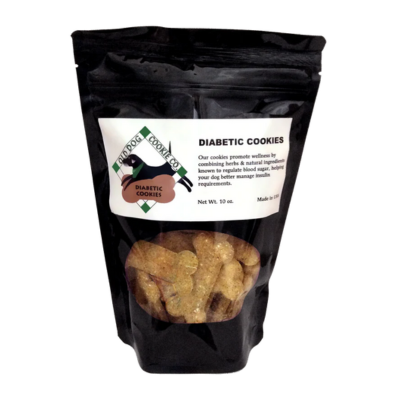
The best overall diabetic dog treats
Specially formulated for diabetic dogs, these all-natural diabetic cookies are ideal for helping you manage the insulin requirement of your pet pooch.
The ingredients include fiber and herbs to help slow your dog’s food metabolism rate, which in turn helps better manage their diabetes. There is natural pectin which boosts your fur friends’ immune system and is great for their all-round health, contributing to controlling sugar in the blood.
Dr. Diana Hasler says: "These treats are high in fiber, which can help regulate glucose in diabetic dogs, and they do not contain any added sugars."
Reasons to buy: All-natural ingredients, includes organic ingredients, no additives, and contains a source of vitamin C and vitamin A.
Reasons to avoid: Generic flavor and not grain-free.
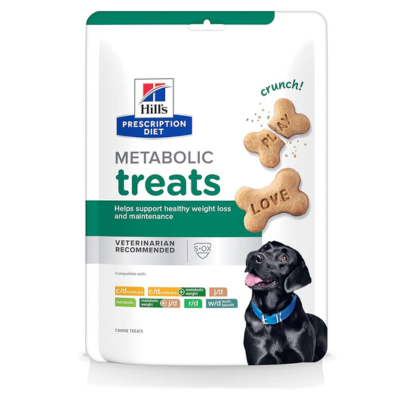
The best budget diabetic dog treats
Tasty, nutritious, and designed to help support healthy weight loss and maintenance, these crunchy, bone-shaped biscuits pack a flavor punch and are crammed full of goodness.
Created with wholesome ingredients, moderate fat, and increased fiber to help support a healthy weight, these treats are moderate in calories, protein, and phosphorus, low in sodium, and have increased fiber to support digestion.
Ideal for sensitive stomachs, they're the only treats specifically formulated to compliment the nutrition of Hill's Prescription Diet and are made with quality ingredients that will support the health and well-being of your canine companion.
Reasons to buy: Crunchy texture, low in sodium, and easy to digest.
Reasons to avoid: Hard texture that may be difficult for tiny teeth.
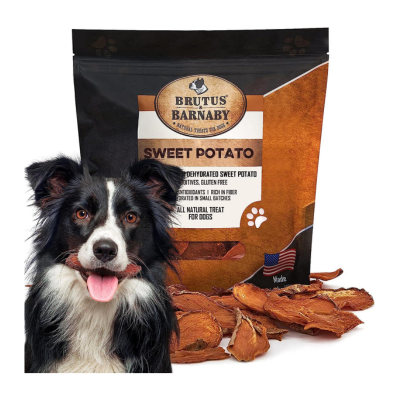
The best premium diabetic dog treats
If you are looking for a meat-free, low-odor treat that will keep your pooch occupied for a little longer than the average treat, these could be just what you're looking for. They provide a great source of natural fiber, vitamins, and minerals.
You can go guilt-free every time you give your dog the treat. They have zero fat, and no added sugar, and the fiber in them helps balance blood sugar levels, making them ideal for diabetic dogs. They are gluten and grain-free, making them easier to digest, and ideal for dogs with sensitive stomachs.
Dr. Hasler says: "These treats are made up of only dehydrated sweet potatoes, which are high in fiber. They do not contain any fat or added sugars."
Reason to buy: Single ingredient, free from grain and gluten, no preservatives, and good source of fiber.
Reason to avoid: Meat-free and not the best size for small/toy breeds.
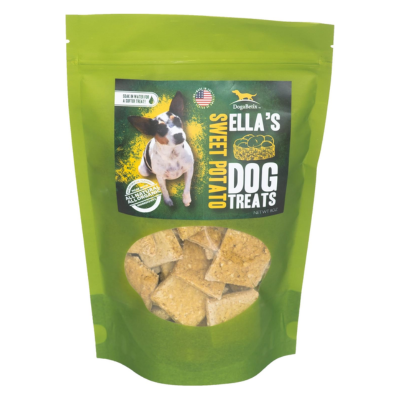
The best organic diabetic dog treats
These treats are made from all organic, all-natural, low-glycemic index ingredients. The glycemic index is a scale – that goes from one to 100 – that helps determine which foods are less likely to impact blood sugar levels significantly, so dog treats with low-glycemic ingredients are much more likely to stop your dog from falling ill.
Dr. Hasler says: "These treats come in three different flavors—sweet potato, pumpkin, and chicken. The brand claims that they are sugar-free and that they will not cause spikes in blood glucose, however, they do not openly advertise their ingredients list. If you wish to feed these treats to your diabetic dog, I recommend discussing the ingredients listed on the packet with your vet to determine if these will be safe for them."
Reasons to buy: Organic, free from additives, preservatives, sugar, potato, corn, flour, dairy, and gluten.
Reasons to avoid: Not grain-free.
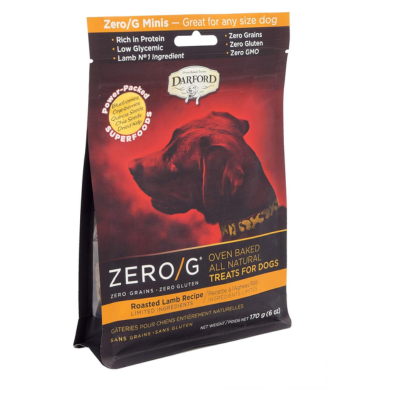
The best oven-dried diabetic dog treats
If you want a treat that packs protein and doesn't pile in unnecessary extras, then the Zero/G Minis by Darford should definitely be on your list. Crucially, for dogs who are diabetic, these treats are low glycemic so they won't pose a problem.
These treats can easily be snapped in half if you want to control the portions. You may want to do this because the treats are not as mini as the packet makes out.
One thing which caught our eye is that each one is made using real meat. The manufacturer says no meals or by-products go into the treats. The ingredients also include blueberries, chia seed, dried kept and whole quinoa and they offer vitamins A and C, calcium, iron and niacin.
Reason to buy: Made from real meat, free from grain, gluten and GMO.
Reason to avoid: A bit larger than "mini".
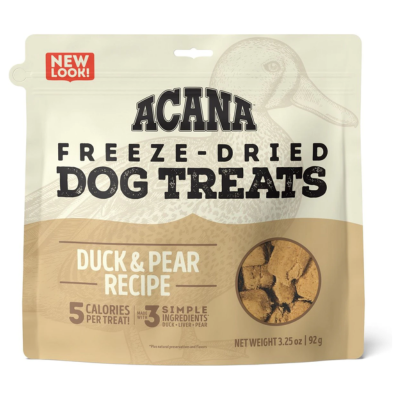
The best duck-based diabetic dog treats
These treats are 100% natural and raw duck ingredients make up more than 70% of each treat, with only pears and a preservative added. This means they're extremely low in sugar and lacking in carbs.
It's going to be very difficult for your pooch to pack on the pounds with these treats given that each one contains just five calories. And since they are freeze-dried, you can be sure that the nutrients have been locked away.
ACANA raises its animals naturally and the ingredients are delivered fresh to the kitchen.
Reasons to buy: Contains natural raw ingredients, each treat is just five calories and freeze-dried to lock in nutrients.
Reasons to avoid: It would be good to have more in a pack.
How to choose the best diabetic-friendly dog treats
It can be confusing to know what is and isn’t safe for your diabetic dog to eat. However, when choosing treats you should follow the same rule as you do for their daily diet, sticking to products that are low in simple carbohydrates.
Simple carbohydrates (sugars) are easier to digest and more readily absorbed into the bloodstream than complex carbohydrates. Dogs with diabetes are unable to produce enough insulin to deal with this, leading to spikes in blood sugar. Glucose, sucrose, lactose, and maltose are all simple carbohydrates and can be found in ingredients like corn syrup, some vegetables, fruits, and molasses. While these are fine for normal dogs to eat in moderation, picking alternative treats that are high in complex carbohydrates (fiber) and lower in calories is crucial for diabetics.
Treats that are high in protein, and low in fat, are also ideal. Fish or lean meats like chicken or turkey, are also less likely to raise your dog’s blood sugar than treats that rely heavily on simple carbohydrates.
Can you give a diabetic dog treats between meals?
Yes. Dr. Isuru Gajanayake, head of clinical nutrition at Willows Veterinary Centre and Referral Service, says it is fine to give a diabetic dog treats between meals “provided these are consistent in terms of the type, amount, and time given.” In other words, keep a close eye on how many treats you are giving to a dog and try not to load a dog up on them close to meal times either.

Is peanut butter good for dogs with diabetes?
Dr. Gajanayake says you need to be cautious about giving peanut butter to dogs with diabetes.
“Peanut butter is generally considered safe in people with diabetes as it mainly contains fat rather than carbohydrate,” he says. “Although a small amount of peanut butter will be fine as a treat for diabetic dogs, I usually avoid such human foods in my patients.”
What should you not feed a diabetic dog?
Having a dog living with diabetes means your pet must follow a more restrictive diet.
“The most important aspect of a good diet for a diabetic dog is that it is balanced, so a commercial canned/dry diet or a home-cooked diet which has been formulated by a veterinary nutritionist,” says Dr Isuru Gajanayake.
“Secondly, a diet which has more of the calories provided from fat and protein (compared to carbohydrate) may help with diabetes. Thirdly, avoiding carbohydrates that are rapidly digested and absorbed into the bloodstream can help reduce the blood sugar peaks after eating. Complex carbohydrates and fiber can help reduce the blood sugar peak after eating.”
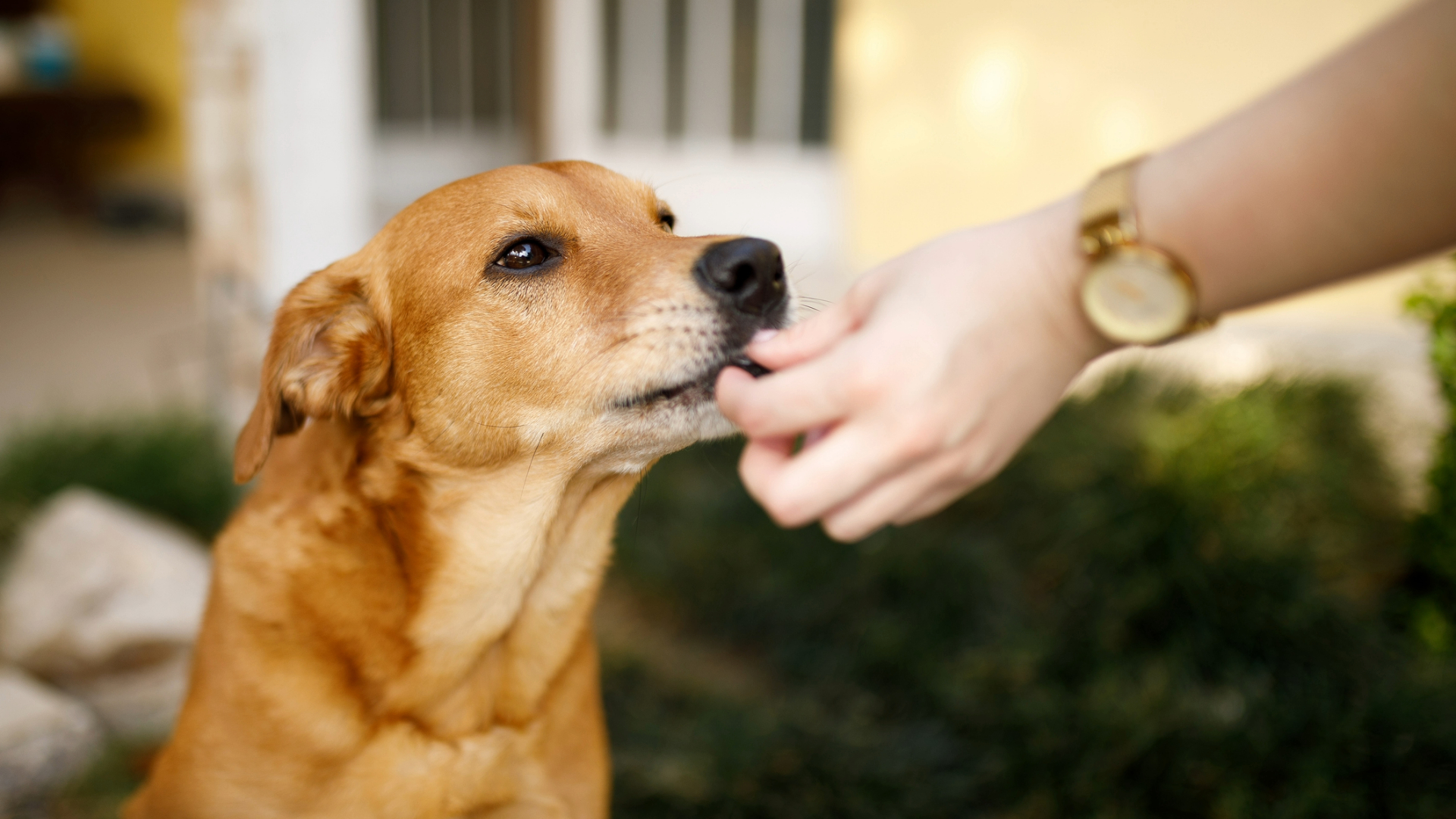
How do diabetic dog treats differ from regular treats?
Diabetic dog treats differ from normal treats as their ingredients are carefully selected to follow the principles detailed above. This includes being low in sugar and calories, and higher in fiber and protein, reducing any negative impact on the management of your dog’s condition.
One of the most important things to remember though, is that you must still only give these treats occasionally and under the direction of your vet. Too many treats of any kind could cause an imbalance in their diet affecting how well their condition is controlled. Always speak to your vet if you are unsure about what your dog can safely have.
Can I feed human food as a treat for my diabetic dog?
While some human foods — such as chicken, blueberries, and sweet potatoes — are healthy and even appear in diabetic dog food, it’s not always appropriate to give them as treats, as they might still cause your dog’s blood sugar to spike.
Consult your vet before offering your pup any human food as a treat. Your vet is the best resource for creating a safe and healthy treat routine for your dog.
Can non-diabetic dogs eat these treats?
The good news is that your other dogs can enjoy diabetic treats too, and they may even be better on their waistline than the regular alternatives! This may help to keep things simple as all of your dogs can receive the same type of snack, with no one feeling left out.

Megan is Staff Writer on PetsRadar and graduated from the University of Westminster with a degree in BA Journalism. She covers everything from dog training tips to the best pet products. You'll often find her reading about new training techniques or trying out the latest pet gadgets. As a former dog owner, she knows that treats are one of the quickest ways to a pup's heart. However, with so many options, it can be hard to know what to choose. That's why she's rounded up the best dog treats, taking the ingredients into careful consideration.

A 2009 graduate of the University of Florida College of Veterinary Medicine, Dr. Georgina Ushi works in the Tampa Bay area, providing compassionate care to dogs and cats. Alongside her clinical work, she consults for pet well-being brands and writes for her blog, Pet Health Love. Dr. Ushi is passionate about sharing her knowledge to educate and inspire pet owners, and her professional interests include emergency and critical care, wildlife medicine, nutrition, and hospice and palliative care.
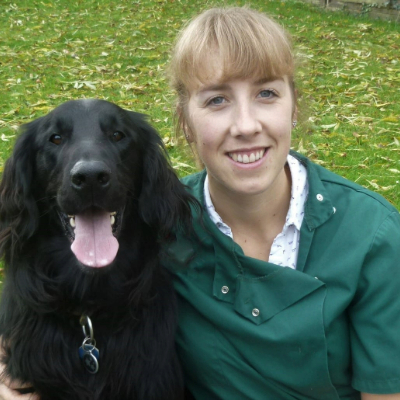
Dr. Rebecca MacMillan is a companion animal vet with over 13 years of experience treating and looking after pets. She graduated from the UK Royal Veterinary college in 2009, and has worked in several practices over the years. Rebecca is also an experienced writer, using her vet background to offer expert opinion and advice.

Dr. Diana Hasler graduated with distinction from the University of Edinburgh Royal (Dick) School of Veterinary Studies in 2018. She has experience working as a small animal vet in general practice, where she has treated many dogs, cats, rabbits, and rodents. Here, Dr. Hasler gives her opinion on each of the products in our guide.

Dr. Gajanayake graduated from the University of Sydney in 1998. After spending two years in mixed practice in rural Australia, he moved to the United Kingdom to work as a small animal vet locum and also traveled around Europe. He then joined Willows' general practice clinic in 2002. During the following three years in this post, Dr. Gajanayake developed an interest in medicine and successfully completed the RCVS Certificate in Small Animal Medicine. In 2005, he moved to the Royal Veterinary College to undertake a one-year rotating internship, followed by a combined residency in small animal internal medicine and clinical nutrition. Dr. Gajanayake was the first resident to undertake a clinical nutrition training program in the UK. Following the end of his residency, Isuru successfully achieved specialist status from the American College of Veterinary Internal Medicine in 2010. He became a diplomate of the American College of Veterinary Nutrition in 2016.
PetsRadar Newsletter
Get the best advice, tips and top tech for your beloved Pets
Steve Jenkins is a freelance content creator and long-time journalist with more than 20 years in the industry. He has written for numerous titles covering tech to pets, with his latest faithful hound always by his side. When not walking his dog, or discussing who’s best - cats or dogs? Loud guitars, AFC Bournemouth, Photoshop, and trying to save the world take up the rest of this time.
- Dr. Diana Hasler BVM&S MRCVS
- Liz FinchAnimal welfare expert
- Megan MilsteadStaff Writer
